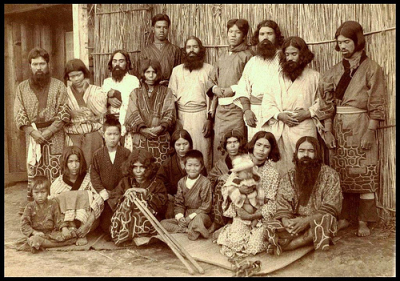On June 6, a couple of months prior to the International Day of the World's Indigenous People, the Japanese Diet passed a resolution to officially recognize the Ainu as an indigenous people. Immediately following the passage of the resolution, a government panel held its first meeting to start working on a plan to put these words into action. While this development marked a historical turning point for the Ainu, bloggers were far from unanimous in their responses to the passage of the resolution.
Blogger abe-iw welcomes the Diet resolution:
昨日2008年6月6日は、画期的なメモリアルデーとして歴史の一ページに長く記録されることになるだろう。この日、アイヌ民族を先住民として認め、関連する政策の一層の推進を政府に求める国会決議が、参議院本会議において全会一致で可決・採択されたのだ。
June 6, 2008 will go down in the pages of history as a groundbreaking memorial day. On this day, the Diet resolution calling for the government to recognize the Ainu as an indigenous people and to further implement related measures was unanimously passed and approved during the Upper House plenary session.
[…]ようやく法の下に平等をうたった憲法第14条の精神が、ここ日本においてもまっとうに遵守されることになったのだ。この間、関係者・関連団体のたゆまざる情熱と努力は敬服に値するが、それにも増して昨年年9月13日、国連総会において採択された「先住民族の権利に関する宣言」や、きたる7月に開かれる「北海道洞爺湖サミット」が今次決議実現の追い風になったことは、報道の示すとおりであろう。悲惨な戦乱や度を越す暴力沙汰が絶えない今日、先住民・少数民族の主権を尊重しようという最近の動きは、人々の心の奥底にまだ残っている良識が垣間見えた感がし喜ばしい限りである。[…]
[…]Finally, Japan has complied with the spirit of Article 14 of the Constitution, which ensures equality before the law. Although the passion and the efforts of people and organizations that have been involved [in this movement] are worthy of respect, the passage of the Declaration on the Rights of Indigenous Peoples adopted by the United Nations on September 13the of last year, and the G8 Hokkaido Toyako Summit scheduled for this coming July, helped [make possible] the realization of the passage, as reported in the media. In the world of today, with horrible wars and extreme violence that never ends, the recent move to respect the sovereign rights of indigenous people and enthnic minorities offers a glimpse of the decency at the bottom of people's hearts, and this makes me so happy.[…]
While appraising the resolution as a milestone, Eunheui thinks that there is something missing:
先住民族として認め(られ)ることが一里塚であることは確かだ。しかし、この文書はアイヌの権利を保障するための何ら具体的な政策提起も含んでいないし、歴史認識に言及こそするものの、それを自分のものとして非をあがなう道に踏み込もうとはしない臆病な文章だと私は思う。私は決議案を作った人たちの善意や良心を疑いはしないが、残念ながら、この文章を今から何十年か経って読み直した時にそこに燦然と輝く人権擁護の宣言を見出せるという予感は全くしない。

Photo by Flickr user Okinawa Soba (used under CC-BY-NC-SA ).
Akio Ikeuchi, however, questions the goverment's involvement in preservation of an indigenous culture. He agues that it is the Ainu people's role, not that of the government, to show their commitment in restoring their culture and ethnic identity:
6日,「アイヌ民族を先住民族とすることを求める決議」が国会で採択された。が,おそらく私の感覚が鈍いのだろう。私には今さらどうしてこのような決議が必要なのかが分からないのである。
私は別にアイヌを先住民族と見なすことに反対したいわけではない。が,日本民族にほとんど同化吸収されてしまったアイヌを,いまさら分離する必要がどうしてあるというのだろうか。
I am not trying to oppose recognizing the Ainu as an indigenous people. However, why is it necessary to isolate the Ainu, who have nearly been assimilated into Japanese society, now?
[…]もしアイヌの人たちが今の日本とは一線を画する形で自分たちのアイデンティティーを取り戻したいというのであればそれもまた一つの立場であろう。その場合,かつてのアイヌの地をアイヌの人たちに返すべきだとも言えるだろう。その際,日本はアイヌの自立を支援すべきでもあるだろう。
が,国会決議が
政府に対し,アイヌを独自の言語,宗教や文化を有する先住民族と認め,有識者の意見を聞きながらアイヌ政策を総合的に行うことを求めている(同)などという甘い話であるなら,果たしてアイヌの人たちはどこまで独自の文化を保つべく自立しよういう覚悟を持ち合わせているのか疑問になってくるだろう。
However, the Diet resolution calls for the government to acknowledge the indigenous people with their language, religion and culture, and to comprehensively implement Ainu policies, consulting experts’ opinions. This is naive thinking, and the question arises as to how determined the Ainu people are to become autonomous in order to preserve their own culture.
民族文化が保存されるためには,民族自体に生きる力,すなわち「生命力」がなければならない。が,今回のように政府に援助を要求すること自体,その力の弱さを物語っているのではないか。
本気でアイヌ文化を復興したいのであれば,政府の助けを借りないというくらいの気概がまず必要なのではないか。
If they seriously want to recover the Ainu culture, first they need have the guts to say that they do not need the help of the government.
Blogger Yu argues that this resolution suddenly introduces the notion of ethnicity and reshapes the definition of the citizen:
日本は先週まで単一民族国家だった。
不思議な言い方だが、これはマジ。
Until last week, Japan was an ethnically homogeneous nation.
This may be a strange way to say it, but this is real.
アメリカも建国以来ずっと単一民族国家だ。
なぜならアメリカは「個人の権利」は保障するが「民族の権利」は認めていない。
あの国で国民を形成するのは「アメリカ人」だけだ。
America, too, has been an ethnically homogeneous nation since its foundation.
This is because although America ensures the “rights of individuals”, it does not recognize the “rights of ethnic groups”.
The country is made up only of Americans.
日本も全く同じだった。
在日朝鮮人やアイヌや琉球人がいる日本は他民族国家だ、という主張はあったが、これは評論家的な見方に過ぎない。
在日朝鮮人は「日本国民」ではなく在留外国人だし、「国民」は民族ではなく個人を単位としていた。
Japan was exactly the same [in the past].
Arguments have been raised that Japan is a multi-ethnic country, consisting of zainichi Koreans, Ainu, and Ryukyu, but this is just the perspective of critics.
Zainichi Koreans have been defined as foreign residents and not as “Japanese citizens”, and a “citizen” was defined not based on ethnicity but at the level of the individual.
良くも悪くも日本は国民統合に成功した国だ。
アイヌも琉球も、地方の伝統文化に過ぎなくなった。
For better or for worse, Japan is a country that has successfully unified its citizens.
The Ainu and the Ryuku are now no more than mere local traditions.
そんな状況が変わった。
アイヌが先住民族と認められ、国民の中に民族というラインが引かれた。
アイヌが民族なら、それ以外は自動的に大和民族となり、どちらでもない琉球人もまた民族となる。
マスコミもネットもあまり関心はないようだが、これは重大なことだ。
「国民」と「個人」の間に「民族」という枠が突如生まれたのだ。
The Ainu are recognized as an indigenous people and a line called ethnicity has been drawn between the citizens.
If the Ainu are an ethnic group, then the rest [of the Japaense people] automatically become the Yamato people, and the Ryukyu who do not belong to either group become yet another ethnic group.
Neither the mass media nor the net[izens] seem to be interested, but this is a grave issue.
A framework for “ethnicity” has suddenly emerged between the “citizen” and the “individual”.
それは民族の権利を保障し、自決権を認めるということにもなる。
つまりアイヌが独立を主張すれば、大和民族はそれを否定する権利を持たない。
沖縄にしても同じだ。6日のことは、実は、現状追認に過ぎなくなるであろう憲法改正などよりはるかに大きく、国家の形を左右する出来事だったかもしれない。
This also means that ethnic rights will be ensured and the right to self-determination will be recognized.
In other words, if the Ainu claim their independence, the Yamato people have no right to deny it.
What happened on June 6th was, in fact, much more significant than the amendment of the Constitution […] and is an event that could change the shape of the nation.







6 comments
Please back resolutions to protect these people and thier cuylture